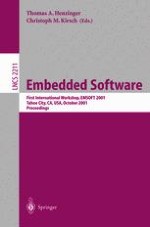
2001 | OriginalPaper | Chapter
Heterogeneous Modeling Support for Embedded Systems Design
Authors : Perry Alexander, Cindy Kong
Published in: Embedded Software
Publisher: Springer Berlin Heidelberg
Included in: Professional Book Archive
Activate our intelligent search to find suitable subject content or patents.
Select sections of text to find matching patents with Artificial Intelligence. powered by
Select sections of text to find additional relevant content using AI-assisted search. powered by
Effective design of embedded computer systems requires considering information from multiple domains in a model-centered approach. Using a model-centered approach, the system designer defines and composes models representing multiple system perspectives throughout the design, implementation and testing process. Rosetta is a heterogeneous systems-level modeling language designed to support specification and analysis of complex, computer-based systems. Rosetta provides a model-centered specification capability that allows specifiers to define and combine system models. Users define models, called facets, and assemble those models to define components and systems using facet composition. Each facet model is written with reference to a domain that defines a vocabulary and semantics for the model definition. To model interaction between specifications from different domains, Rosetta provides an interaction definition mechanism based on institution theory. The Rosetta model-centered specification approach allows systems designers to specify many domains of interest from many perspectives and supports predictive design analysis at the systems-level.